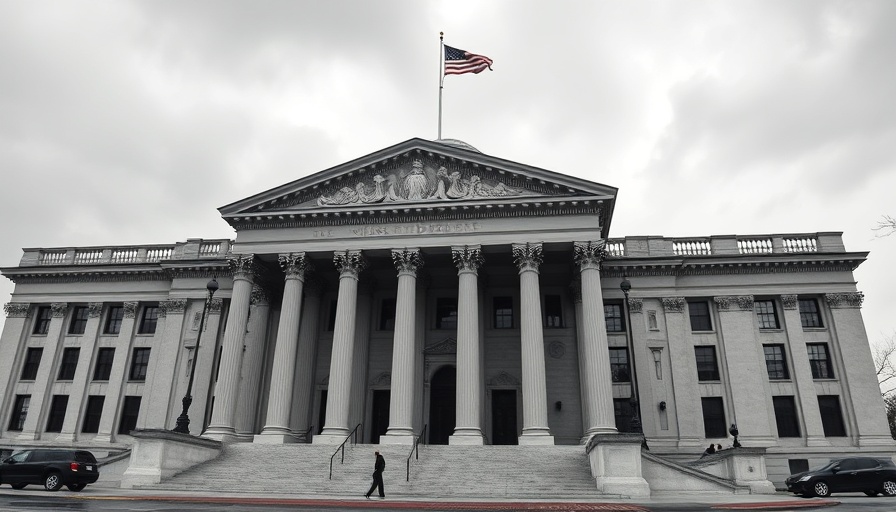
White House's Bold Move Strikes at Small Business Capital
The recent axing of the entire staff of the Community Development Financial Institutions (CDFI) Fund by the White House is reverberating across the small business landscape of America. This unprecedented decision comes amid ongoing government layoffs and signifies a troubling trend for access to critical capital resources for entrepreneurs.
Understanding the CDFI Fund's Role
Founded in 1992, the CDFI Fund was established to channel capital into economically distressed areas nationwide. It primarily supports Community Development Financial Institutions (CDFIs) which operate in communities often overlooked by traditional bank systems. These institutions not only provide loans but also offer services such as business training, mentorship, and other resources crucial for fostering small enterprises.
In fiscal year 2024 alone, the CDFI Bond guarantee program provided $54.5 million to small businesses, illustrating its impact on helping entrepreneurs secure necessary funding.
The Immediate Consequences for Small Businesses
Critics of the layoffs argue that dismantling the CDFI Fund is catastrophic for small business owners already struggling to navigate a funding landscape that has become increasingly hostile. According to John Arensmeyer, founder and CEO of Small Business Majority, this move is baffling given the CDFI Fund's historical bipartisan support and proven track record of enhancing business opportunities for the most vulnerable entrepreneurs.
With only 36% of small businesses able to secure the funding they seek, the impact is clear: reducing resources from the CDFI Fund could push many businesses closer to the brink of failure, particularly in the current economic climate characterized by tariffs and inflationary pressures.
Historical Support and Future Implications
The CDFI Fund has enjoyed bipartisan support because it provides crucial assistance to communities that see limited investment from national banks. In fact, many small businesses have reported relying on these microloans and financial services to build and expand their operations when traditional avenues failed them.
As pointed out in recent statements from industry leaders, without the CDFI Fund, thousands of jobs could be lost, and the overall economic stability of underserved neighborhoods might be jeopardized. The decision to eliminate its funding comes at a critical juncture as small businesses are still recovering from the impacts of the pandemic and a shifting economic landscape.
Counterarguments and Alternative Perspectives
Proponents of government spending cuts argue that austerity measures are necessary for reducing national debt and reining in spending that they view as excessive. Yet, those in favor of maintaining and strengthening the CDFI Fund assert that reducing support for small businesses undermines broader economic goals. Cutting funds to areas that traditionally lack financial assistance could exacerbate existing inequalities.
The disconnect illustrated by these differing viewpoints suggests the need for a nuanced understanding of economic policy and its on-the-ground impact to ensure that decisions truly foster sustainable growth.
Beyond the Numbers: The Human Element of Entrepreneurship
At the heart of these statistics are real people's aspirations. Entrepreneurs frequent the CDFIs looking for more than just funds; they're seeking partners who understand their unique challenges and are willing to offer guidance and support. This human connection is vital in fostering creativity, innovation, and ultimately, the job creation that fuels the American economy.
Many entrepreneurs have shared personal stories of how CDFIs not only provided the financial support they needed but also mentorship that transformed their business ideas into thriving enterprises. Losing such a resource would mean losing the stories of success that embody the spirit of entrepreneurship.
Conclusion: The Call for Action
As the consequences of these cuts unfold, a collective response from the small business community and policymakers is essential. Advocating for the reinstatement of the CDFI Fund could pave the way for restoring economic stability in underserved communities and supporting future entrepreneurial efforts. Those who care about building a vibrant economy must consider how detrimental these cuts could be and work to incentivize rather than hinder small business growth.
In light of this situation, it is vital for business owners and advocates alike to unite in defense of programs like the CDFI Fund that play a pivotal role in sustaining entrepreneurship in America. The health of the nation’s small businesses should take precedence over budgetary cuts that disproportionately affect those who are already battling an uphill financial struggle.
 Add Row
Add Row 
 Add
Add 


Write A Comment